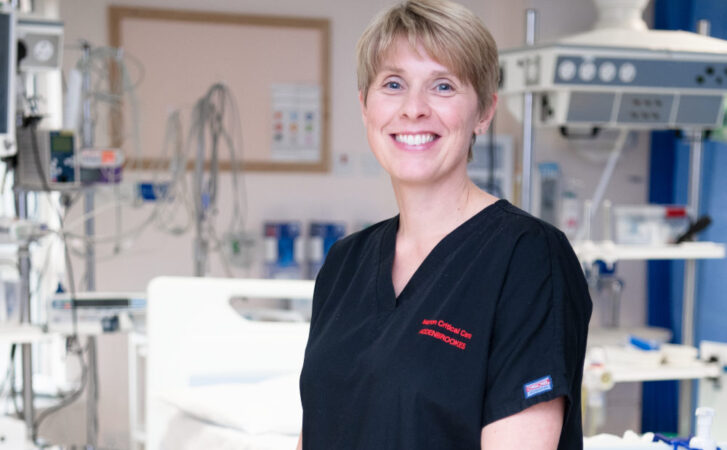Uncategorised
12 May 2020
Addenbrooke’s Charitable Trust, the NHS charity for Addenbrooke’s hospital, is marking International Nurses’ Day by highlighting the contribution of over 3,300 nurses and the vital and varied work they do every day, which is now being undertaken in the shadow of the coronavirus.
The hospital has quadrupled its intensive care capacity and nurses have been caring around-the-clock for the many patients in desperate need of extra care and ventilation. Many have been asked to redeploy to different areas of the hospital and have had to adjust to a ‘new normal’.
Jo Franklin, Clinical Nurse Specialist in the Palliative Care Team, said: “I usually work to support people with incurable illnesses to live well. The pandemic has meant that as an ex-ICU and Neuro Critical Care Unit (NCCU) nurse I was asked to redeploy there.”
“I now look after patients with COVID-19 and patients with neurological problems such as brain injuries and brain haemorrhages. Some of the care has naturally been supporting patients to have good end of life care and facilitating difficult conversations in the current situation with no visitors allowed to the hospital.”
Everybody wants to do their bit to help. Mark Harvey, Lead Nurse for the Paediatric Intensive Care Unit, said: “The most dramatic effect has been the use of our staff to help out the adult critical care areas. This has proven very stressful for some, but of course the necessity is understood.”
Additionally, services and items provided by Addenbrooke’s Charitable Trust through donations from the public before the current crisis, are making a real difference. The ACT funded Psychological and Wellbeing Service has proved vital during this time. Jane Olds, Matron for Adult Critical Care, says: “Intensive Care Units (ICU) are frightening environments for patients and their loved ones… this can result in post-traumatic stress disorder (PTSD) type damage. The psychological welfare service for our patients and families helps their ‘PTSD’ and improves their quality of life after critical care. It is also helping to address stress suffered by ICU staff.”
Other areas of the hospital are having to make big changes to the way they treat their patients. Hannah Brown, Matron for the Cancer and Haematology Day Units, said: “Many patients are sadly not receiving anti-cancer treatments at this time, as it is too risky for them during the pandemic. So, the oncology teams are supporting patients and their families in different ways, often via telephone calls and clinics, rather than face-to-face. We have merged the Oncology and Haematology Day Units, the latter which was largely funded by ACT, and set up a new location as an ‘outreach’ centre at a GP surgery, so that we can keep patients and staff away from the main hospital units and keep them safe.”
ACT also funds research within the hospital from personalised breast cancer research to current research into diagnostics and treatment for COVID-19. The way that research is being carried out has also been affected and research nurses have had to adapt too. “Even greater flexibility and collaboration than usual is required to adapt to new studies, while supporting the current crisis”, says Petra Polgarova, Research Nurse in Critical Care. “We have had to adapt our study procedures and their delivery to ensure the safety of both participants and staff looking after them.”
Susana Borja is a Specialist Nurse and Senior Research Nurse. She looks after patients with rare genetic kidney disease and works on a research project studying specific cardiac conditions. She agrees, saying: “This pandemic has impacted our roles significantly. We continue to provide a service to our patients in the renal clinic but have had to adapt and be very flexible. That has meant working from home, telephone appointments and providing more counselling to support our patients as levels of anxiety are high. We’ve also had to seek alternative locations to perform assessments and blood tests to minimise risk of COVID-19 exposure.”
Christi Deaton is the Florence Nightingale Foundation Clinical Professor of Nursing. She tells how changing to remote working has been challenging at times, “We are amending our study to be able to conduct it remotely, analysing the data we have, and considering how we can assess the impact of the pandemic on our patients with heart failure.” She added: “This pandemic is also stimulating research ideas from nurses and midwives.”
ACT is asking you to continue to support the amazing staff at Addenbrookes. Donations have massively helped the hospital before the current crisis and your continued donations will support our hospital do so much more than is currently funded by the NHS, helping to make Addenbrooke’s even better for everyone. Please visit www.helpyourhospital.co.uk.
Return to news
